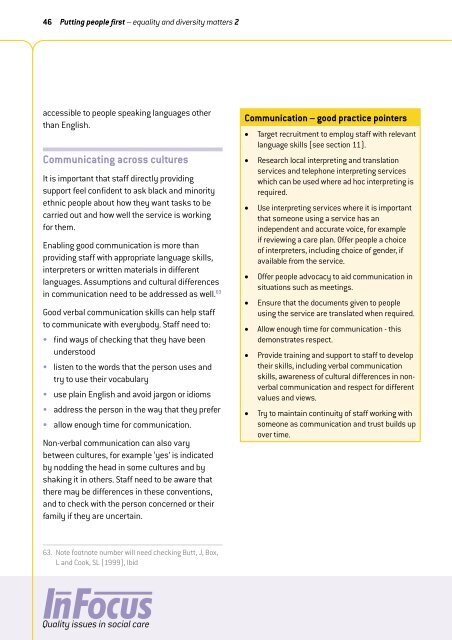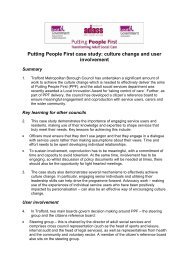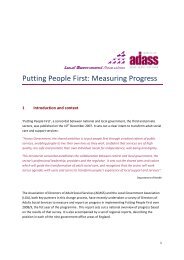Putting people first: Equality and Diversity Matters 2 - Think Local Act ...
Putting people first: Equality and Diversity Matters 2 - Think Local Act ...
Putting people first: Equality and Diversity Matters 2 - Think Local Act ...
You also want an ePaper? Increase the reach of your titles
YUMPU automatically turns print PDFs into web optimized ePapers that Google loves.
46 <strong>Putting</strong> <strong>people</strong> <strong>first</strong> – equality <strong>and</strong> diversity matters 2accessible to <strong>people</strong> speaking languages otherthan English.Communicating across culturesIt is important that staff directly providingsupport feel confident to ask black <strong>and</strong> minorityethnic <strong>people</strong> about how they want tasks to becarried out <strong>and</strong> how well the service is workingfor them.Enabling good communication is more thanproviding staff with appropriate language skills,interpreters or written materials in differentlanguages. Assumptions <strong>and</strong> cultural differencesin communication need to be addressed as well. 63Good verbal communication skills can help staffto communicate with everybody. Staff need to: find ways of checking that they have beenunderstood listen to the words that the person uses <strong>and</strong>try to use their vocabulary use plain English <strong>and</strong> avoid jargon or idioms address the person in the way that they prefer allow enough time for communication.Non-verbal communication can also varybetween cultures, for example ‘yes’ is indicatedby nodding the head in some cultures <strong>and</strong> byshaking it in others. Staff need to be aware thatthere may be differences in these conventions,<strong>and</strong> to check with the person concerned or theirfamily if they are uncertain.Communication – good practice pointersTarget recruitment to employ staff with relevantlanguage skills (see section 11).Research local interpreting <strong>and</strong> translationservices <strong>and</strong> telephone interpreting serviceswhich can be used where ad hoc interpreting isrequired.Use interpreting services where it is importantthat someone using a service has anindependent <strong>and</strong> accurate voice, for exampleif reviewing a care plan. Offer <strong>people</strong> a choiceof interpreters, including choice of gender, ifavailable from the service.Offer <strong>people</strong> advocacy to aid communication insituations such as meetings.Ensure that the documents given to <strong>people</strong>using the service are translated when required.Allow enough time for communication - thisdemonstrates respect.Provide training <strong>and</strong> support to staff to developtheir skills, including verbal communicationskills, awareness of cultural differences in nonverbalcommunication <strong>and</strong> respect for differentvalues <strong>and</strong> views.Try to maintain continuity of staff working withsomeone as communication <strong>and</strong> trust builds upover time.63. Note footnote number will need checking Butt, J, Box,L <strong>and</strong> Cook, SL (1999), Ibid
















